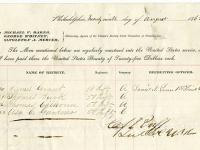Answer: The Citizens' Bounty Fund
In 1862, President Abraham Lincoln called for another 300,000 Union troops after the Army of the Potomac failed to take Richmond, Virginia. The War Department gave each state a quota to fill, but recruitment was slow. Concerned about a possible draft, Philadelphia Mayor Alexander Henry led a public meeting on July 24, 1862, to discuss how best to increase enlistment. They decided to create a bounty fund to pay volunteers for enlisting, a tactic that other cities were using. The attendees at the meeting donated $40,000 to create the bounty fund, and two days later, Philadelphia City Council voted to allocate $500,000 to the fund. A large number of private citizens met at Independence Hall to donate another $160,000. A committee of individuals from the city’s elite, with Mayor Henry serving as chair, administered the Citizens’ Bounty Fund.
Philadelphia City Council approved giving $50 bounties to new regiment volunteers for three years. The council also approved paying $6 to volunteers in existing regiments. Philadelphia filled its enlistment quota without needing to turn to a draft, but the Citizens’ Bounty Fund Committee concluded in early 1863 that the bounty system was a waste of money. Worse, they concluded that the bounties encouraged desertion. The committee planned to turn over any remaining money to the cause of aiding soldiers and their families.
For further information, HSP's collection of Citizens' Bounty Fund Committee records (#1558) is a useful resource. It contains administrative papers of the committee, as well as the enlistment and bounty records of the men who qualified for money under the system.
Image: Bounty Certificate, Paid (1862)

